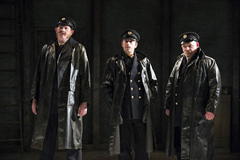| Opera Reviews | 19 April 2024 |
An engaging and thought-provoking performanceby Catriona Graham |
|
| Maxwell Davies: The Lighthouse English Touring Opera October 2012 |
|
|
Although the programme notes do not make the connection, Max's chamber opera follows the closing line of the poem written about the mystery - 'Three men alive on Flannan Isle who thought on three men dead'. The first act, or prologue, shows the three naval officers who discovered that the three keepers of the Fladda lighthouse were missing. The stage is set as half the circular room of the lighthouse. As they give their evidence to the court of the enquiry, the sailors' different personalities are revealed - as are the differences in their stories. Tenor Adam Tunnicliffe concentrates hard on the (unheard questions) and chews over his answers. The men act out how the overturned chair lay, where the broken cup was found, the journey to and arrival at the lighthouse. Their vigorous stamping and thrashing with their oilskin coats at the black rats which emerge from the building is disturbing. In the lighthouse, the three keepers have been there too long and are getting on each other's nerves. There is the religious one (Arthur), the Jack-the-Lad who mocks the other's religion (Blazes), and the younger, quieter one who, unsurprisingly, turns out to be gay (Sandy). The tension rises, the tempers too, and an attempt to diffuse the situation by suggesting Blazes sing a song spectacularly backfires. Nicholas Merryweather (Blazes) is excellent singing the street ballad (accompanied by jangly violin and banjo) of how, aged 11, he murdered the old woman upstairs for her money and let his drunken, abusive father swing for it. But the bargain he struck with his fellows was that they had to sing too. Adam Tunnicliffe (Sandy) sings a sweet, romantic chanson (with slightly discordant orchestral accompaniment) of young love, and the other men join in. Finally, Richard Mosley-Evans (Arthur) sings a rousing, church-militant hymn. Then things break down. Blazes' hallucinations of the murder are frightening, and certainly scare Sandy, whose own memories are triggered by the romantic song, which turns out to have been about incest and an early gay encounter. Both Merryweather and Tunnicliffe clearly portray the angst of their characters. Finally, Arthur flips - it is perhaps, a fault in the opera that Maxwell Davies gives Arthur religion and nothing more, as if having religion is enough explanation for madness, and we need not question what it is Arthur is using his observance to suppress. The opera ends with the automatic light sweeping round and casting shadows - Guy Hoare's lighting throughout is highly effective and enhances Neil Irish's design. Together with the three singers, director Ted Huffman and Richard Baker conducting the Aurora Orchestra deliver an engaging and thought-provoking performance of this intriguing opera. |
|
| Text ©
Catriona Graham Photo © Richard Hubert Smith |

 As the nights draw in, and the Hallowe'en party goods appear in shop
windows, our thoughts may turn to ghouls and ghosts and things that
go bump in the night. In the case of English Touring Opera, the thoughts
manifest themselves in a production of Peter Maxwell Davies' realisation
of the Flannan Isles lighthouse mystery - relocated to Fladda.
As the nights draw in, and the Hallowe'en party goods appear in shop
windows, our thoughts may turn to ghouls and ghosts and things that
go bump in the night. In the case of English Touring Opera, the thoughts
manifest themselves in a production of Peter Maxwell Davies' realisation
of the Flannan Isles lighthouse mystery - relocated to Fladda. 





